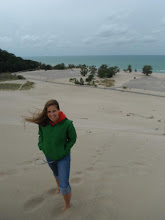I just got back from a few days spent down the bayou-- with a sawyer who retired when he saw what his environmental impact was, with a group of leaders from environmental foundations, and with some elders in the Point-au-Chien community. It's been busy, and overwhelming at times, and exciting at others. I'll write more about each meeting, but while I ponder these adventures, I wanted to share this:
Please take a moment to watch and share. This is so, so important. BP really hasn't released much funding for environmental cleanup or restoration, much less to cover the economic, social and health problems created by the Horizon disaster. They just keep making carefully worded commercials that lead the rest of the world to believe things are ok down here. They aren't.
Sometimes I get really overwhelmed by the myriad problems here. There are so many different environmental issues, which overlap with so many social issues, which overlap with health and economic and cultural issues. It's so much. What can I do as one person?
I will be a hummingbird.
(I know I've shared this before, but it doesn't get old. This motivates me.)
30 September 2013
27 September 2013
Spartina alterniflora
BEST DAY EVER AHHHH IT WAS AWESOME!
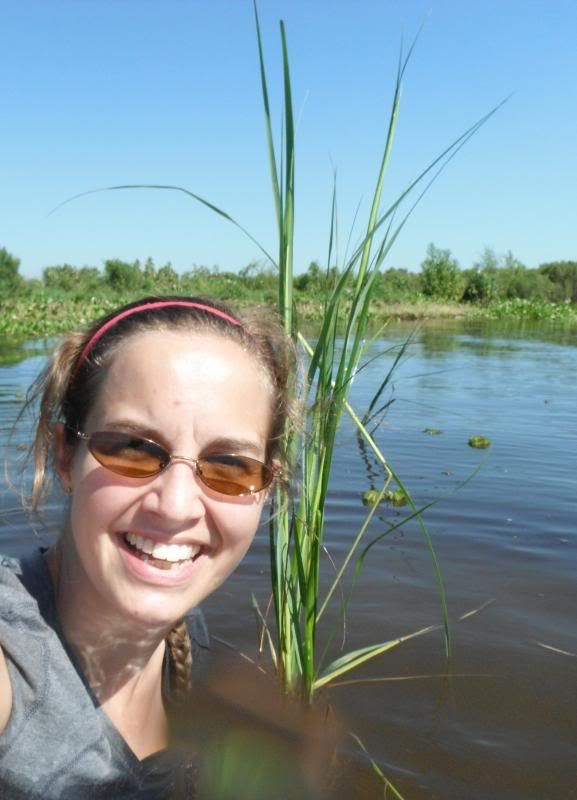
I was really excited and barely slept on Wednesday night, last noticing the clock around midnight... ugh. But, at 4:45 sharp, I was leaving New Orleans, heading to a USDA Service Center in Thibodaux, just over an hour southwest of the city. I found it (remember that time I was stuck in traffic in Raceland? That's how to get there from NO!), and joined two employees of the local soil and water conservation district (not exactly my beloved NRCS, but the local government cooperators) to plant cord grass (not exactly trees, but ok, stay with me here, it was awesome) in Little Lake (not exactly a little lake, more like a half hour boat ride after an hour drive south from Thibodaux, but still, this was awesome) with a team of European hipster volunteers (who were not at all dressed or prepared for the work we were doing) and an alligator (who never came closer than about 20 feet but hung out for the entire afternoon).
None of that sounds especially great, but I assure you, I had a fantastic day.
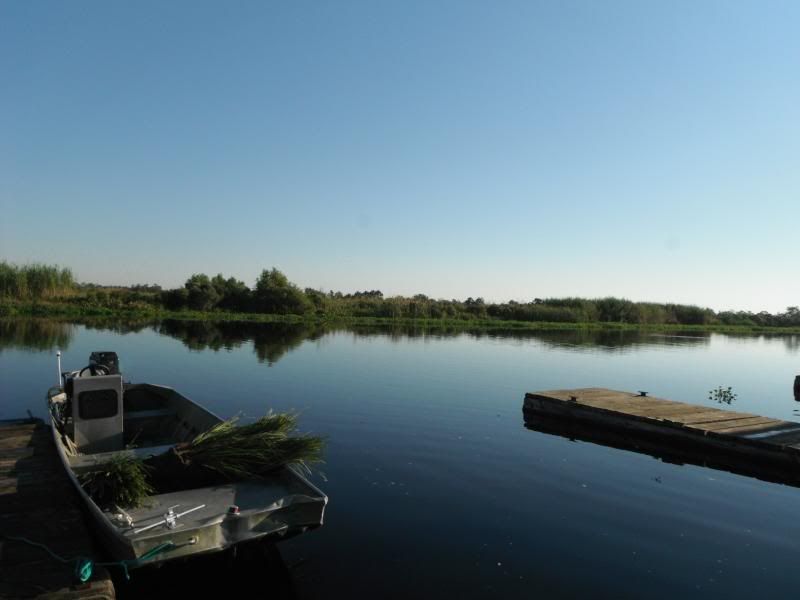
We were met by a producer who provided us with about 40 sacks of about 50-60 plugs of smooth cord grass each. We launched from a canal at the back of a sugarcane farm in Cut Off. It took a few trips to deliver all of the grass and people to the shoreline where we were planting (if you zoom out, it's down the canal east, then just north about halfway up that curved shore).
View Larger Map
Planting in open water is kind of cool. For the most part, the ground is just soft and mucky, so we just kind of grabbed the little root ball of the grass and punched it into the ground. Even the harder ground, or the areas where more shells had accumulated, it was still pretty easy with the help of a thing called a dibble bar:

We started the morning spread out, dividing and conquering a swath of shore line. I had a really nice time just swimming around planting grass on my own. Shortly before lunch, the girl from Denmark noticed a six foot long alligator spying on her work. We ate lunch together on the boat near that spot, hoping to scare the gator away. It worked, but we decided to work closer together to finish the work. This was a good decision, because the alligator came back. It just sat and watched at a distance for a while, slowly closing that distance and making us all a little nervous. There was much discussion about how quickly alligators can move and what their hunting habits are like. It seemed like it was just hanging out, waiting for us to freak out and abandon our weakest herd member.
But we didn't, and nothing terrible happened, just a beautiful day in a warm lake with a cool breeze, planting cord grass. I love doing conservation. It's been really wonderful talking with people, hearing stories, and dreaming up how we can make a difference, but it's another thing altogether to go out and actually do something. I'm pretty excited that I've been able to do so much in just my first month here. It's hard to believe that I arrived exactly a month ago today!
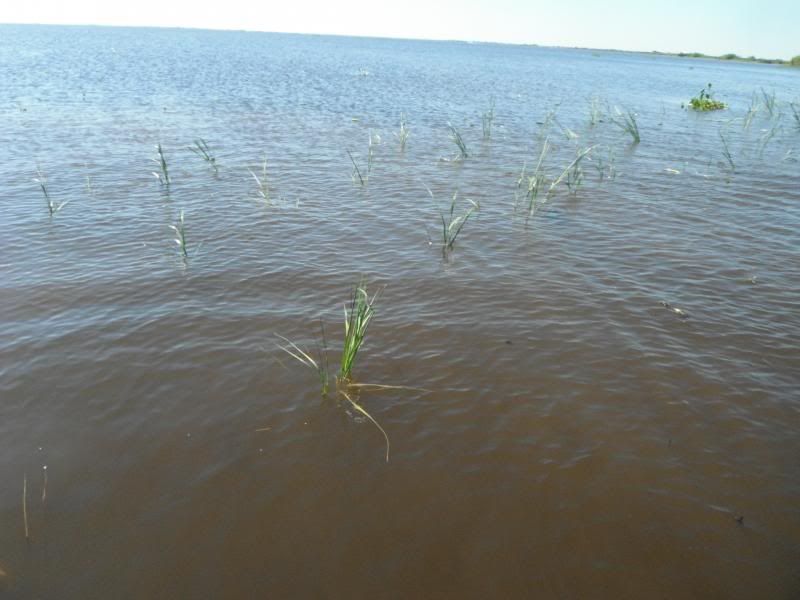

I was really excited and barely slept on Wednesday night, last noticing the clock around midnight... ugh. But, at 4:45 sharp, I was leaving New Orleans, heading to a USDA Service Center in Thibodaux, just over an hour southwest of the city. I found it (remember that time I was stuck in traffic in Raceland? That's how to get there from NO!), and joined two employees of the local soil and water conservation district (not exactly my beloved NRCS, but the local government cooperators) to plant cord grass (not exactly trees, but ok, stay with me here, it was awesome) in Little Lake (not exactly a little lake, more like a half hour boat ride after an hour drive south from Thibodaux, but still, this was awesome) with a team of European hipster volunteers (who were not at all dressed or prepared for the work we were doing) and an alligator (who never came closer than about 20 feet but hung out for the entire afternoon).
None of that sounds especially great, but I assure you, I had a fantastic day.

We were met by a producer who provided us with about 40 sacks of about 50-60 plugs of smooth cord grass each. We launched from a canal at the back of a sugarcane farm in Cut Off. It took a few trips to deliver all of the grass and people to the shoreline where we were planting (if you zoom out, it's down the canal east, then just north about halfway up that curved shore).
View Larger Map
Planting in open water is kind of cool. For the most part, the ground is just soft and mucky, so we just kind of grabbed the little root ball of the grass and punched it into the ground. Even the harder ground, or the areas where more shells had accumulated, it was still pretty easy with the help of a thing called a dibble bar:

We started the morning spread out, dividing and conquering a swath of shore line. I had a really nice time just swimming around planting grass on my own. Shortly before lunch, the girl from Denmark noticed a six foot long alligator spying on her work. We ate lunch together on the boat near that spot, hoping to scare the gator away. It worked, but we decided to work closer together to finish the work. This was a good decision, because the alligator came back. It just sat and watched at a distance for a while, slowly closing that distance and making us all a little nervous. There was much discussion about how quickly alligators can move and what their hunting habits are like. It seemed like it was just hanging out, waiting for us to freak out and abandon our weakest herd member.
But we didn't, and nothing terrible happened, just a beautiful day in a warm lake with a cool breeze, planting cord grass. I love doing conservation. It's been really wonderful talking with people, hearing stories, and dreaming up how we can make a difference, but it's another thing altogether to go out and actually do something. I'm pretty excited that I've been able to do so much in just my first month here. It's hard to believe that I arrived exactly a month ago today!

25 September 2013
Presenting...
today's adventure: my first presentation!
I got to spend my evening with people from Brigantine, NJ (woo hoo practically my people!) and Murrysville, PA who are currently staying and working in New Orleans with Project Homecoming. One of the houses they are currently working on, under the good supervision of one of my housemates, Anna Leigh, is the home of Professor Longhair. I think that is spectacular. (One of the goals of Project Homecoming is to rebuild communities, not just houses, and what better way to help the community but fix up one of their hometown heroes' homes? Also I think his daughter was still living there before it got beat up by Katrina.)
Now that you have some great background music...
I was worried about the presentation because 1. I am excited about and interested in just about everything, so it's hard to decide what's actually important and interesting for other people who live outside of my brain; 2. It is difficult to convey the dire environmental crisis happening in southern Louisiana's wetlands by walking through a relatively healthy marsh just outside of New Orleans. We talked about how these landforms are made, why they matter, and why they are falling apart. Those were the main points I wanted to cover, and I talked about them all, so I feel ok about it.
I received some good feedback though, so it went all right. I was even able to answer almost all of the questions! Except for this one: how big is the dead zone in the Gulf of Mexico (the area in which nothing can grow or live because of all of the pollution that accumulates at the bottom of the enormous Mississippi River watershed)? Which I am now reading up on... it's awful. It varies throughout the year, but averages between the size of the state of Connecticut and the state of New Jersey.
...
That's a terrible note to end on. But a few more people understand what's going on down here, and at the end of our walk at Bayou Sauvage, there were a few alligators hanging out in the canal, so everyone came away pretty excited. I was talking to people about birds by then, but I'll try to get pictures next time.
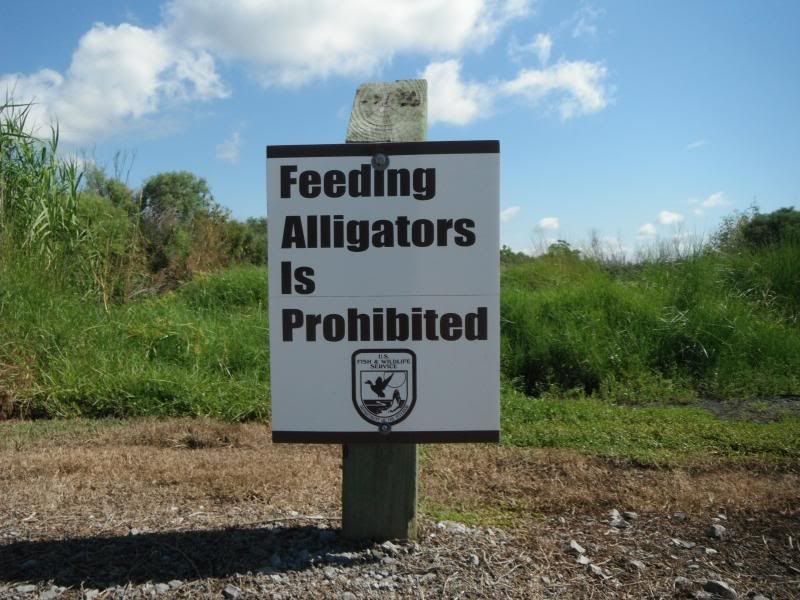
Tomorrow's adventure: traveling south with NRCS to plant trees! Along bayous! In the water?
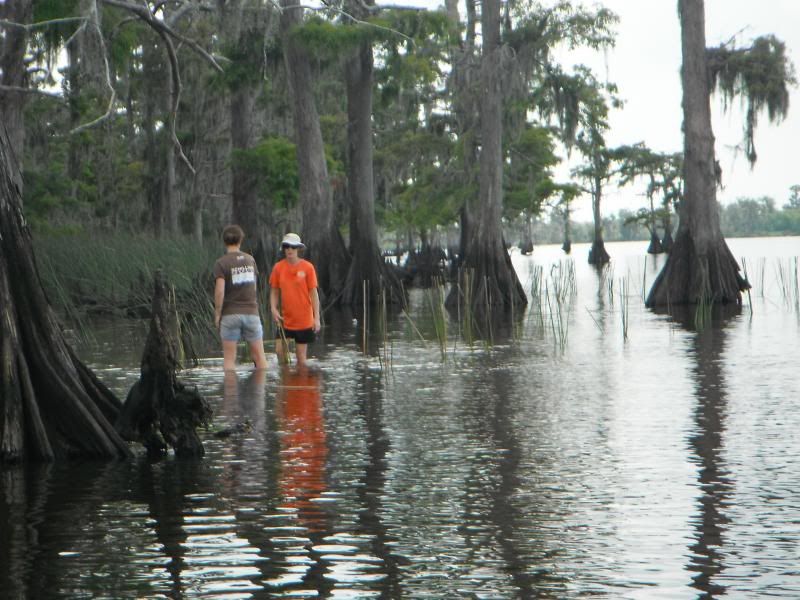
This was the picture they sent me when I asked about appropriate attire for such field work, not realizing we would not be working on solid ground...
I got to spend my evening with people from Brigantine, NJ (woo hoo practically my people!) and Murrysville, PA who are currently staying and working in New Orleans with Project Homecoming. One of the houses they are currently working on, under the good supervision of one of my housemates, Anna Leigh, is the home of Professor Longhair. I think that is spectacular. (One of the goals of Project Homecoming is to rebuild communities, not just houses, and what better way to help the community but fix up one of their hometown heroes' homes? Also I think his daughter was still living there before it got beat up by Katrina.)
Now that you have some great background music...
I was worried about the presentation because 1. I am excited about and interested in just about everything, so it's hard to decide what's actually important and interesting for other people who live outside of my brain; 2. It is difficult to convey the dire environmental crisis happening in southern Louisiana's wetlands by walking through a relatively healthy marsh just outside of New Orleans. We talked about how these landforms are made, why they matter, and why they are falling apart. Those were the main points I wanted to cover, and I talked about them all, so I feel ok about it.
I received some good feedback though, so it went all right. I was even able to answer almost all of the questions! Except for this one: how big is the dead zone in the Gulf of Mexico (the area in which nothing can grow or live because of all of the pollution that accumulates at the bottom of the enormous Mississippi River watershed)? Which I am now reading up on... it's awful. It varies throughout the year, but averages between the size of the state of Connecticut and the state of New Jersey.
...
That's a terrible note to end on. But a few more people understand what's going on down here, and at the end of our walk at Bayou Sauvage, there were a few alligators hanging out in the canal, so everyone came away pretty excited. I was talking to people about birds by then, but I'll try to get pictures next time.

Tomorrow's adventure: traveling south with NRCS to plant trees! Along bayous! In the water?

This was the picture they sent me when I asked about appropriate attire for such field work, not realizing we would not be working on solid ground...
Labels:
bayou,
charismatic megafauna,
Louisiana,
New Orleans,
photos,
wetlands,
YAV
23 September 2013
another morning, another walk
I love morning walks.
Goal for self: learn at least 15 local trees this year. So far:
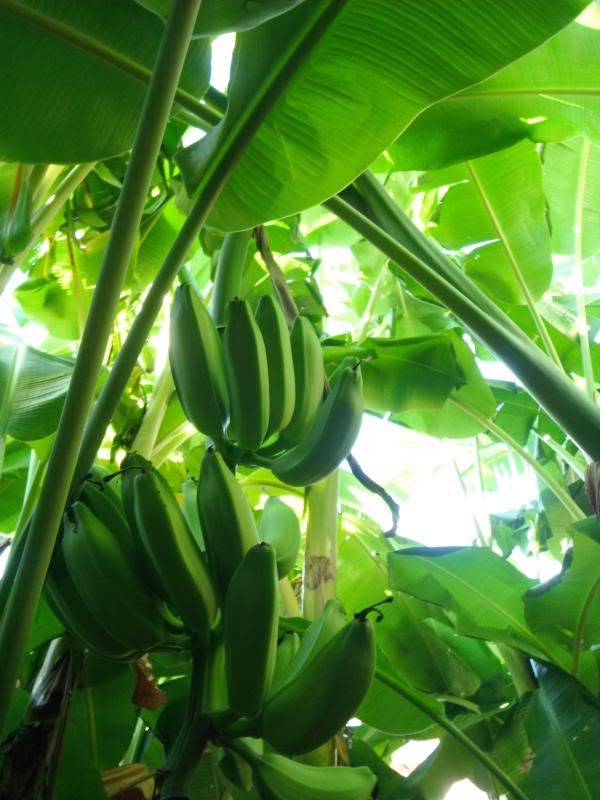
Goal for self: learn at least 15 local trees this year. So far:
- Live oak
- Sand live oak (yes, that's different)
- Magnolia
- Cypress
- Crepe myrtle

20 September 2013
Bayou Sauvage
I've never had a particularly meaningful relationship with birds. I mean, they're cool, and I like hearing them in the background, but I prefer to walk around with my Field Guide to North American Trees book because they stay still while I identify them.
I remember one time several years ago going to the Forsythe National Wildlife Refuge down near Atlantic City with Mike. It was well before we were dating, and he just wanted to go take pictures of birds. It was a gray, drizzly fall morning, and I was happy to go along for the ride and get some fresh air down in the wetlands and not really pay any attention to the birds. I learned that day that Mike knows a lot about birds, and I have subsequently directed about 97% of all bird questions and comments to him ever since.
Fast forward a few years till Mike, Katie and I were driving from Irwin, PA to Walpole Island, ON last summer. We stopped at some sort of wildlife or bird refuge in Ohio, on Lake Erie. There was a bird watching room in the visitors' center, with a big window overlooking a little area with a village of bird houses and feeders. There were a lot of birds. It was rather noisy. So I was testing Mike--
"What kind of bird is that?" Red winged black bird.
"What kind of bird is that?" Some sort of finch.
"What kind of bird is that?" Red winged black bird.
"No, the one with the yellow on its wing." Red winged black bird.
"No, the one with yellow on its wing." Red winged black bird.
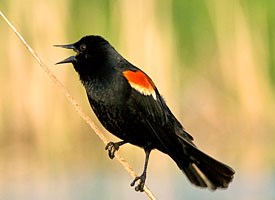
So that about sums up my relationship with birds.
Yesterday I traveled east to Bayou Sauvage, just to look around and get familiar with the park. I'm giving my first presentation next week to a group of volunteers visiting New Orleans with Project Homecoming, where several of my roommates work, and I was asked that when weather permits, to actually bring the groups to the wetlands. I think that's a lovely idea, especially since Bayou Sauvage is only about 15 minutes away from where the volunteers stay during their time of service. I was met by a professor from UNO who knows a lot about the area. It was great to have a guide.
The park is really nice. There are a few different places to park and hike, with well maintained boardwalks through the wetlands and paths along the levees. I'm a little intimidated by the size of the group (next week's is about 30 people, but in the future it could be up to 90)-- mostly worried whether or not I'll be able to really present anything to such a large contingent out in the field effectively. But I'm excited to show them the actual environment I'm talking about.
Bayou Sauvage was hit hard by Katrina, taking out a lot of older cypress and live oak trees, but it's a pretty healthy ecosystem. There have been various planting and mulching projects, among other conservation efforts, but really, nature will heal itself over time if we just leave it alone. Say it with me-- humans are the worst! But it is in pretty good shape, and is a really good look at that healing process.
Before leaving the refuge, the professor and I stopped by another trail area that's actually an impressive bird rookery. I was amazed at how many birds we saw just from this one little stretch of boardwalk. Some of them looked familiar, like things I've seen in the wetlands at home-- little herons and egrets, some sand piper kind of things (again, you can see how good I am at birding).
Apparently the place will be full of birds in November and December as they migrate every which way (you know, or south). I might need to investigate. There's a train line that runs along the back edge of the refuge, and a freight train passed through as I was leaving yesterday. Watching all of the birds jump up and circle before realizing it was just a harmless train was pretty incredible. This was the first time I really recognized the diversity and beauty of birds. Doesn't mean I'm going to learn how to identify them, because they still move too fast for me, but it was just a really beautiful moment that this blog entry isn't going to do justice, so I'm going to stop trying to describe it now.
I remember one time several years ago going to the Forsythe National Wildlife Refuge down near Atlantic City with Mike. It was well before we were dating, and he just wanted to go take pictures of birds. It was a gray, drizzly fall morning, and I was happy to go along for the ride and get some fresh air down in the wetlands and not really pay any attention to the birds. I learned that day that Mike knows a lot about birds, and I have subsequently directed about 97% of all bird questions and comments to him ever since.
Fast forward a few years till Mike, Katie and I were driving from Irwin, PA to Walpole Island, ON last summer. We stopped at some sort of wildlife or bird refuge in Ohio, on Lake Erie. There was a bird watching room in the visitors' center, with a big window overlooking a little area with a village of bird houses and feeders. There were a lot of birds. It was rather noisy. So I was testing Mike--
"What kind of bird is that?" Red winged black bird.
"What kind of bird is that?" Some sort of finch.
"What kind of bird is that?" Red winged black bird.
"No, the one with the yellow on its wing." Red winged black bird.
"No, the one with yellow on its wing." Red winged black bird.

So that about sums up my relationship with birds.
Yesterday I traveled east to Bayou Sauvage, just to look around and get familiar with the park. I'm giving my first presentation next week to a group of volunteers visiting New Orleans with Project Homecoming, where several of my roommates work, and I was asked that when weather permits, to actually bring the groups to the wetlands. I think that's a lovely idea, especially since Bayou Sauvage is only about 15 minutes away from where the volunteers stay during their time of service. I was met by a professor from UNO who knows a lot about the area. It was great to have a guide.
The park is really nice. There are a few different places to park and hike, with well maintained boardwalks through the wetlands and paths along the levees. I'm a little intimidated by the size of the group (next week's is about 30 people, but in the future it could be up to 90)-- mostly worried whether or not I'll be able to really present anything to such a large contingent out in the field effectively. But I'm excited to show them the actual environment I'm talking about.
Bayou Sauvage was hit hard by Katrina, taking out a lot of older cypress and live oak trees, but it's a pretty healthy ecosystem. There have been various planting and mulching projects, among other conservation efforts, but really, nature will heal itself over time if we just leave it alone. Say it with me-- humans are the worst! But it is in pretty good shape, and is a really good look at that healing process.
Before leaving the refuge, the professor and I stopped by another trail area that's actually an impressive bird rookery. I was amazed at how many birds we saw just from this one little stretch of boardwalk. Some of them looked familiar, like things I've seen in the wetlands at home-- little herons and egrets, some sand piper kind of things (again, you can see how good I am at birding).
Apparently the place will be full of birds in November and December as they migrate every which way (you know, or south). I might need to investigate. There's a train line that runs along the back edge of the refuge, and a freight train passed through as I was leaving yesterday. Watching all of the birds jump up and circle before realizing it was just a harmless train was pretty incredible. This was the first time I really recognized the diversity and beauty of birds. Doesn't mean I'm going to learn how to identify them, because they still move too fast for me, but it was just a really beautiful moment that this blog entry isn't going to do justice, so I'm going to stop trying to describe it now.
18 September 2013
and I would walk five miles
After working from home for the past few days, I was getting a little bored of these walls. I was still waiting for several people to return my phonecalls, so I decided to go for a walk. I love walking!
Aaand over five miles later, I'm back and sitting down with a cup of tea. Pleasant way to spend the morning.
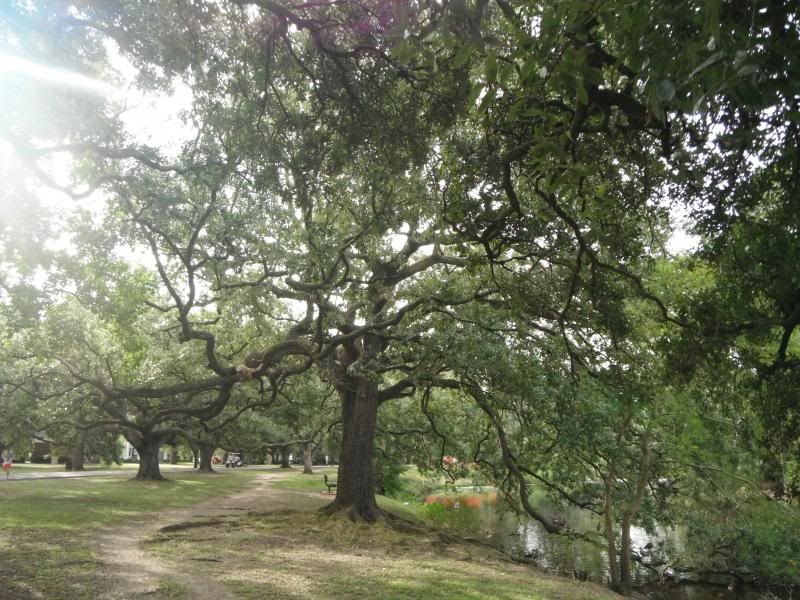
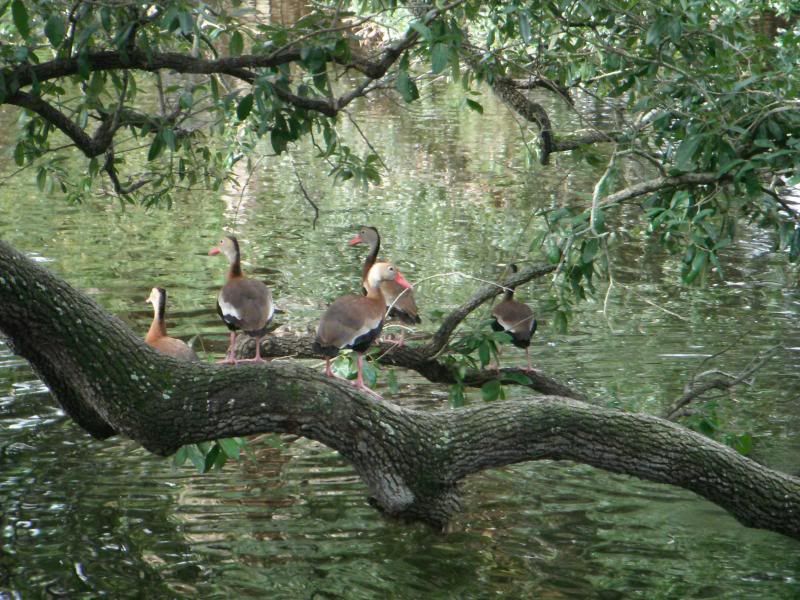
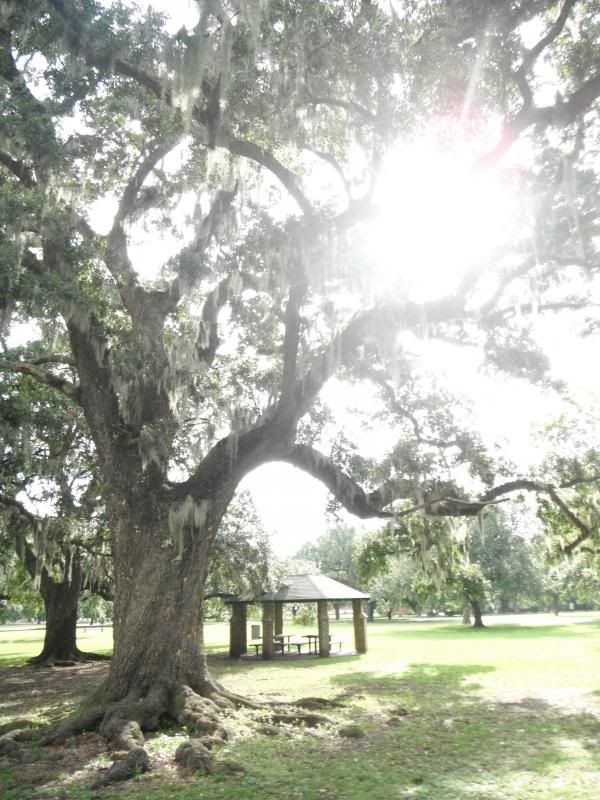
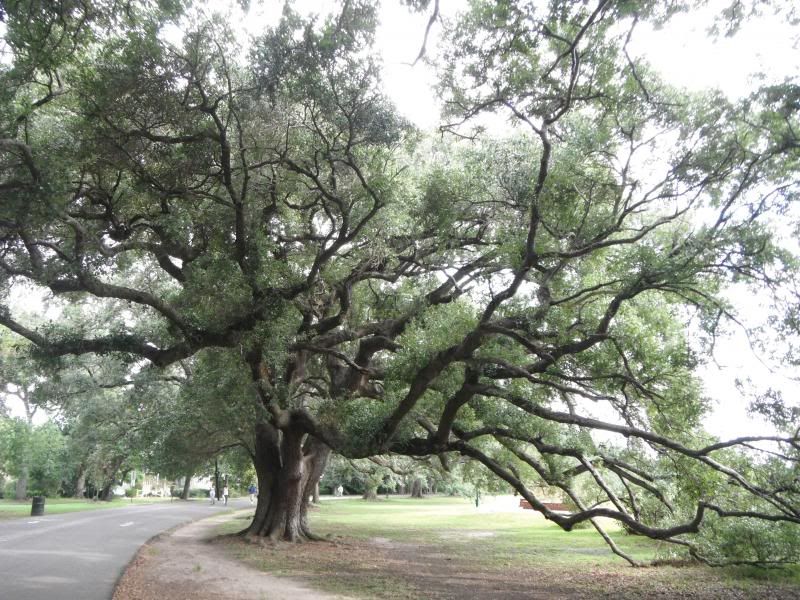
I really love live oaks. New Orleans is full of them. These ones are in Audubon Park. Charismatic megaflora? Google just confirmed: that's a real term. Yessss.
Aaand over five miles later, I'm back and sitting down with a cup of tea. Pleasant way to spend the morning.




I really love live oaks. New Orleans is full of them. These ones are in Audubon Park. Charismatic megaflora? Google just confirmed: that's a real term. Yessss.
Labels:
charismatic megaflora,
Louisiana,
New Orleans,
photos,
trees
15 September 2013
Frenchmen Street
Last night, the vast majority of our household went out to celebrate Alex's imminent birthday.
On Frenchmen Street. In the French Quarter. (After a quick parallel parking lesson-- Jess is now a pro.)
I was immediately and completely overstimulated, but in a really wonderful way.
There were the strings of little white lights strung over the little art market. The crazy neon glowing lights of the party bus that botched the turn onto Frenchmen and sat in the intersection. The flickering oil lamps on the old, French buildings. The dim lights in Maison and the bright lights on the stage where the band was playing.
The smell of my Abita. The smell of the birthday girl's cocktail. Heavily perfumed and cologned people. A man who was apparently homeless and hadn't showered in a while hanging out quietly in the doorway of a business that was closed for the day. The carefully crafted soaps at the market.
The fun blues revue band playing in Maison when we finally arrived! The roar of the crowd there versus the murmur of people wandering along the street between venues. Other bands in other bars. A happy guy on the street rocking out on his ukulele. One band with a guy beat-boxing through his Sousaphone, which is a really impressive sound.
I didn't stay out very long, because my church, my job, is an hour away and starts at 8:30AM (when the congregation was asked if they wanted to change that, the responses were, "You can't wake up early to praise the Lord?" and, "7:30 would be preferable!"). I'll never be the one trying to stay out for very long, either. However, especially in the face of my persistent vegetarianism (yeah, I think that's going to stick), I am really excited about other aspects of this city's culture.
I am excited to go hear good, live music on other nights of the week.
On Frenchmen Street. In the French Quarter. (After a quick parallel parking lesson-- Jess is now a pro.)
I was immediately and completely overstimulated, but in a really wonderful way.
There were the strings of little white lights strung over the little art market. The crazy neon glowing lights of the party bus that botched the turn onto Frenchmen and sat in the intersection. The flickering oil lamps on the old, French buildings. The dim lights in Maison and the bright lights on the stage where the band was playing.
The smell of my Abita. The smell of the birthday girl's cocktail. Heavily perfumed and cologned people. A man who was apparently homeless and hadn't showered in a while hanging out quietly in the doorway of a business that was closed for the day. The carefully crafted soaps at the market.
The fun blues revue band playing in Maison when we finally arrived! The roar of the crowd there versus the murmur of people wandering along the street between venues. Other bands in other bars. A happy guy on the street rocking out on his ukulele. One band with a guy beat-boxing through his Sousaphone, which is a really impressive sound.
I didn't stay out very long, because my church, my job, is an hour away and starts at 8:30AM (when the congregation was asked if they wanted to change that, the responses were, "You can't wake up early to praise the Lord?" and, "7:30 would be preferable!"). I'll never be the one trying to stay out for very long, either. However, especially in the face of my persistent vegetarianism (yeah, I think that's going to stick), I am really excited about other aspects of this city's culture.
I am excited to go hear good, live music on other nights of the week.
13 September 2013
Barataria and Jean Lafitte
I'm pretty sure "Jean Lafitte" is the most French sounding thing I can currently say, although I did learn a new French word yesterday in writing (I don't know how it's pronounced)-- coquille, which means seashell (the first people used to build mounds out of broken shells, and there are a few places in the area that still bear this name).
Jean Lafitte was a pirate in Barataria Bay in the late 1700s/early 1800s, who helped Jackson win the Battle of New Orleans in 1815, using smuggled goods and the knowledge of the pending British attack (they tried to bribe him to help them... ha).
I spent the past two days in the town Jean Lafitte meeting with groups from the Christian Community Development Association. Members are from all over the US and Canada and are currently having their annual conference in New Orleans. The trip to Jean Lafitte to talk about the wetlands with Kris, Dick, the town mayor (and me?) was one of many options they had as side trips. From what I gathered, it was not most people's first choice, but I would say the vast majority were happy they ended up with us touring the wetlands.
Except for the man yesterday who interrupted us mid-discussion to ask when we were going on the boat, because he didn't come for a political discussion...
But everyone else was interested and engaged and excited to see the cypress swamp and hear the stories. And then there is this little guy--
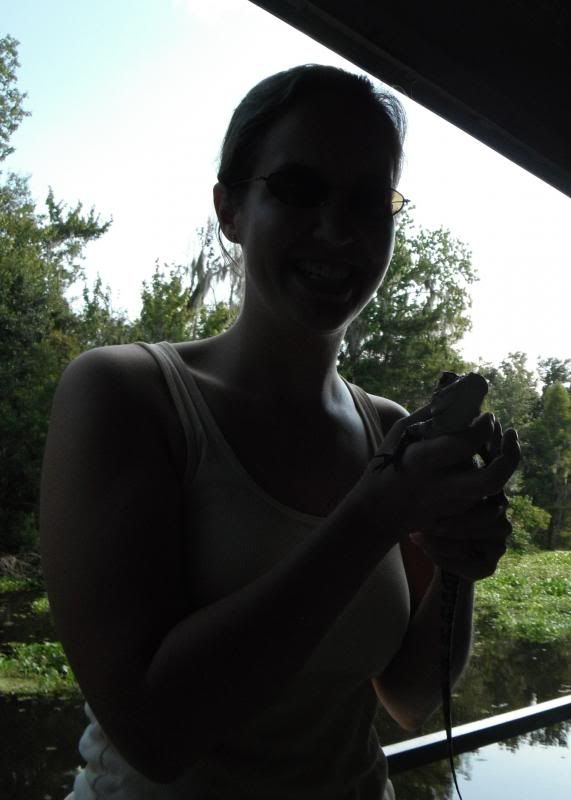
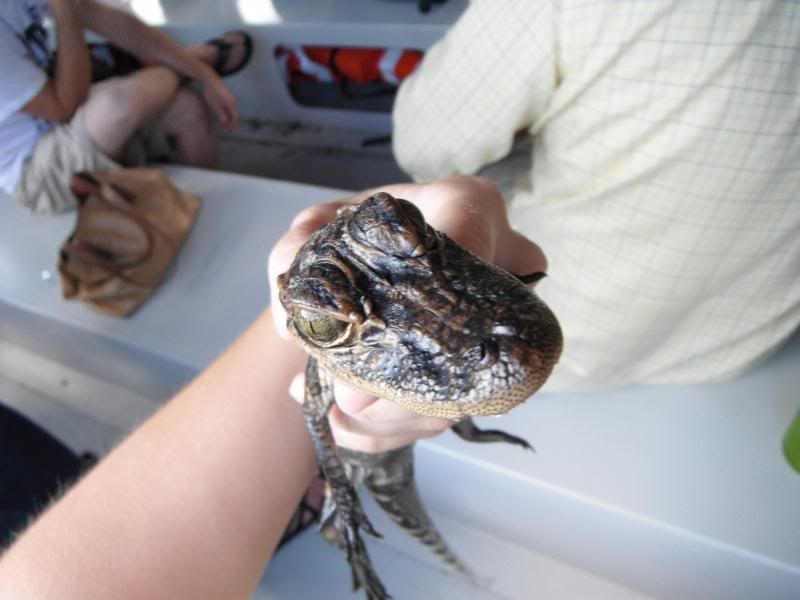
Jean Lafitte is a pretty cool town, with a really great mayor who is working hard not only for his residents, but the residents of four other nearby, unincorporated towns. Has fought for funding for structures to protect the town, even when the government keeps telling them they are not worth it. He secured funding for an affordable healthcare clinic that is also studying and caring for the long term effects of the oil disaster. He won a grant to build a beautiful library, senior center, and meeting facility with a small museum attached in an effort to prove to the state and country that his town is "worth it". Members of his family have served the role of justice of the peace for over a century, for free, just so the town would have services.
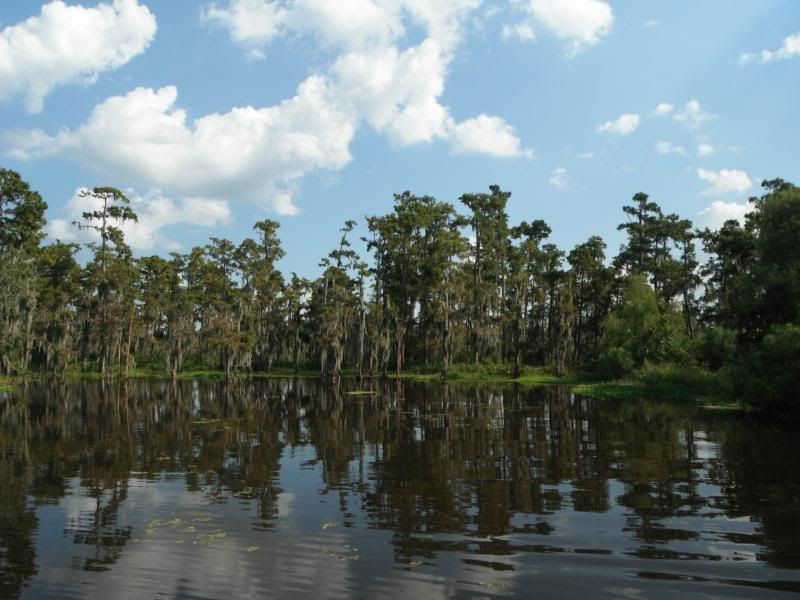
Nothing like spending a beautiful day advocating wetlands and meeting an actual honest politician to give you a little hope.
Jean Lafitte was a pirate in Barataria Bay in the late 1700s/early 1800s, who helped Jackson win the Battle of New Orleans in 1815, using smuggled goods and the knowledge of the pending British attack (they tried to bribe him to help them... ha).
I spent the past two days in the town Jean Lafitte meeting with groups from the Christian Community Development Association. Members are from all over the US and Canada and are currently having their annual conference in New Orleans. The trip to Jean Lafitte to talk about the wetlands with Kris, Dick, the town mayor (and me?) was one of many options they had as side trips. From what I gathered, it was not most people's first choice, but I would say the vast majority were happy they ended up with us touring the wetlands.
Except for the man yesterday who interrupted us mid-discussion to ask when we were going on the boat, because he didn't come for a political discussion...
But everyone else was interested and engaged and excited to see the cypress swamp and hear the stories. And then there is this little guy--


Jean Lafitte is a pretty cool town, with a really great mayor who is working hard not only for his residents, but the residents of four other nearby, unincorporated towns. Has fought for funding for structures to protect the town, even when the government keeps telling them they are not worth it. He secured funding for an affordable healthcare clinic that is also studying and caring for the long term effects of the oil disaster. He won a grant to build a beautiful library, senior center, and meeting facility with a small museum attached in an effort to prove to the state and country that his town is "worth it". Members of his family have served the role of justice of the peace for over a century, for free, just so the town would have services.

Nothing like spending a beautiful day advocating wetlands and meeting an actual honest politician to give you a little hope.
12 September 2013
We interrupt this year of service...
... for an epic bout with homesickness.
I travel a lot. My first sleepover away from home and my parents was when I was a toddler. I have not experienced much of this feeling in my life, so despite years of helping campers through it, I do not know how to handle myself right now.
Times in my life that I have, without a doubt, experienced homesickness:
This is just in April, right after I got back from Arizona--
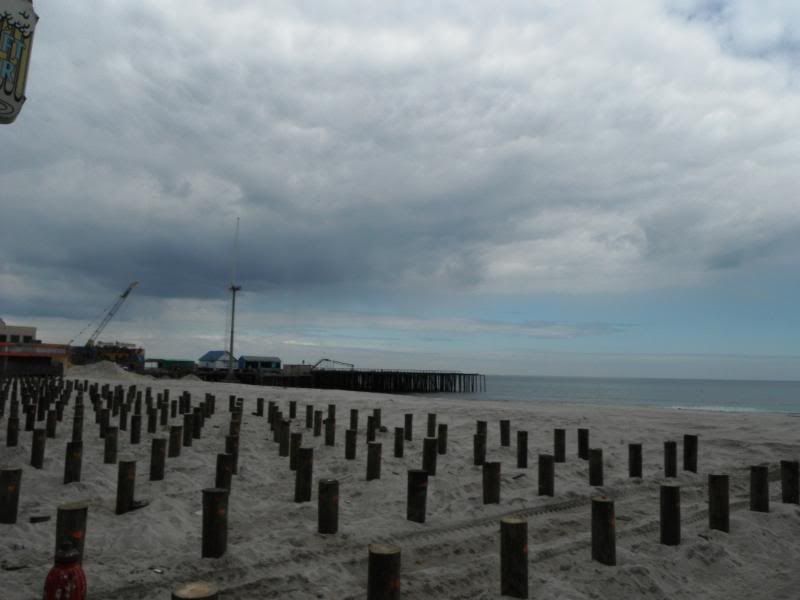
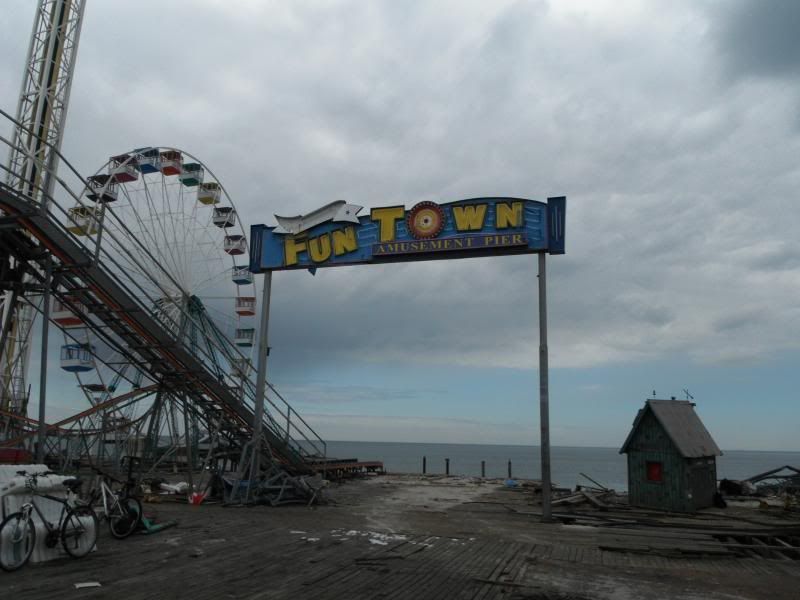
I'm trying to flush out my feelings with words tonight, and it's just not working. It breaks my heart that the very breeze I went to enjoy before moving away from the NJ coast for a year, is causing such destruction of a place so recently put back together. Prayers for the safety of the first responders, and for a change in the weather tonight, and for the community. I miss you, NJ.
I travel a lot. My first sleepover away from home and my parents was when I was a toddler. I have not experienced much of this feeling in my life, so despite years of helping campers through it, I do not know how to handle myself right now.
Times in my life that I have, without a doubt, experienced homesickness:
- Dad's "bad Wednesday" (heart attack) early in my sophomore year of college. I'd spoken to him and knew he was ok, and everyone else told me he was ok, but I needed to get back to NJ and see it for myself. After I went home for a long weekend visit, I felt much better, but still had little inklings of homesickness during the year, worried that I'd be far away when something bad happened to a loved one.
- The day I left for Arizona. Probably only because at that point, I didn't know when I was coming back. It didn't last long, because while I missed people, I also talked to them a lot. It also didn't last long because I just don't tend to get homesick.
- During/after Sandy. There was something deeply unsettling about watching my beloved home state suffer so badly and not being able to do a whole lot about it; also not really being able to talk about it with any sense of sadness or concern because I was the guardian of an 11 year old that week, who I didn't think needed to carry that weight.
- aaaaaaand that's about it, really, till today.
This is just in April, right after I got back from Arizona--


I'm trying to flush out my feelings with words tonight, and it's just not working. It breaks my heart that the very breeze I went to enjoy before moving away from the NJ coast for a year, is causing such destruction of a place so recently put back together. Prayers for the safety of the first responders, and for a change in the weather tonight, and for the community. I miss you, NJ.
11 September 2013
peace
I have a few quiet minutes in my house and a few loud thoughts in my head.
I have nothing to say that hasn't been said about today's date, so I'm going to reflect on peace instead.
When I asked my Presbytery for support for YAV, a friend recommended I apply for the Peacemaking Grant. At first, I wasn't sure how that was relevant since I'm working with wetlands and natural resource conservation. But as I stared at the application and thought on it for a while, I thought about Wangari Maathai. I read her memoir Unbowed as I began grad school, and learned how her love of trees earned her a Nobel Peace Prize, the first awarded to an environmentalist (she also did work seeking gender equality, but founding the Green Belt Movement in Kenya was her better known work). My love of trees hasn't quite gotten me that far, but I think there's something to be said for the connection between peacemaking efforts and environmental conservation.
If we are not at peace with our natural environments, it will be difficult to be at peace with each other in the future when we are struggling over the availability of natural resources.
In southern Louisiana, people are already at odds with the environment, which may or may not even be considered natural anymore. Today I started reading John McPhee's The Control of Nature, which I snagged off the geography department's free book table probably six years ago, and forgot about until I was debating what books to bring to New Orleans. It's about the Army Corps of Engineers (who the people down bayou HATE) and how they changed the hydrology and fluvial geomorphology* of southern Louisiana by building locks and levees in the middle part of the last century. So there's that ongoing battle to keep the Mississippi River flowing exactly where and how the powers that be want it to.
Then, of course, there's the wetlands. I may or may not have mentioned how broken the people's relationship is with that space.
So, as I'm thinking about peace today, I'm thinking my role in the world as a peacemaker and how that relates to the people and places I meet.
*You KNOW I just like throwing around the word "geomorphology".
I have nothing to say that hasn't been said about today's date, so I'm going to reflect on peace instead.
When I asked my Presbytery for support for YAV, a friend recommended I apply for the Peacemaking Grant. At first, I wasn't sure how that was relevant since I'm working with wetlands and natural resource conservation. But as I stared at the application and thought on it for a while, I thought about Wangari Maathai. I read her memoir Unbowed as I began grad school, and learned how her love of trees earned her a Nobel Peace Prize, the first awarded to an environmentalist (she also did work seeking gender equality, but founding the Green Belt Movement in Kenya was her better known work). My love of trees hasn't quite gotten me that far, but I think there's something to be said for the connection between peacemaking efforts and environmental conservation.
If we are not at peace with our natural environments, it will be difficult to be at peace with each other in the future when we are struggling over the availability of natural resources.
In southern Louisiana, people are already at odds with the environment, which may or may not even be considered natural anymore. Today I started reading John McPhee's The Control of Nature, which I snagged off the geography department's free book table probably six years ago, and forgot about until I was debating what books to bring to New Orleans. It's about the Army Corps of Engineers (who the people down bayou HATE) and how they changed the hydrology and fluvial geomorphology* of southern Louisiana by building locks and levees in the middle part of the last century. So there's that ongoing battle to keep the Mississippi River flowing exactly where and how the powers that be want it to.
Then, of course, there's the wetlands. I may or may not have mentioned how broken the people's relationship is with that space.
So, as I'm thinking about peace today, I'm thinking my role in the world as a peacemaker and how that relates to the people and places I meet.
*You KNOW I just like throwing around the word "geomorphology".
10 September 2013
a little peek into my brain this evening
The Young Adult Volunteer program has a lot of different community-focused aspects to it. One is that this community will be intentional-- so we hang out together and make decisions together and work together on purpose. Another is spiritual development, which combines with the intentional community to become my house's Tuesday House Meeting. We talk about the grocery list and chores, but we also take time to discuss some readings and our faith journeys.
This week's meeting, Jess and Kalyn lead us in a discussion ultimately rooted in the Psalms-- psalms of lament, cursing psalms, and psalms of joy. Somewhere between lament and cursing, we talked briefly about the idea of meeting people where they are. Layne shared with us an image that I've heard a few times before, of someone at the bottom of a pit, and two scenarios: one in which others are standing at the top of the pit, inviting the person at the bottom to get out and come join them; one in which someone joins the person at the bottom of the pit, ultimately to help them get out. This image is often used in lessons on counseling.
I was thinking a little bit about Peace Corps again today, because I met someone new who asked me how I ended up in New Orleans with YAV. So when we were talking about lamentation this evening, that is admittedly a little bit of what I was thinking about. I was thinking about how I was so far at the bottom of that pit, and I was so afraid of people standing at the top and telling me to get out that I didn't really talk about the rejection for a month (which became my most viewed blog post ever until recently-- I'll come back to that).
In that month though, I have to give a lot of credit to Mike for absolutely meeting me where I was at the bottom of the pit. We had started seeing each other less than a week before that rejection notice, and the poor guy was probably (definitely) caught between feeling sorry and sad that I was so crushed, and being a little thankful that I wasn't going to leave the country any time soon. I was not sleeping well, and I didn't have the words to talk about the whole ordeal, and it was weighing on me heavily as I attempted to keep it a secret until I did have the words. Mike would come over and just sit. Sometimes we'd watch TV, sometimes we'd just sit. No talking. Sometimes a reassuring pat on the shoulder. Mostly just sitting. (Well, he sat. I often laid because I felt like if I was meeting gravity horizontally, I couldn't fall any further.)
I had to take a deep breath just now. Just thinking about that whole time slams me with a lot of different emotions, and we all know I'm kind of a robot about feelings sometimes.
So about a month later was this:
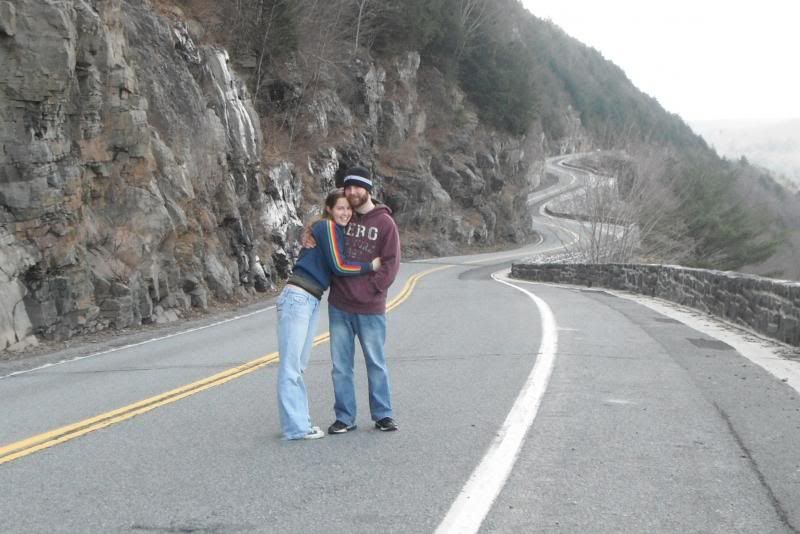
which we could probably draw all sorts of metaphors about the crazy winding road behind us there. And now eighteen months later is this:
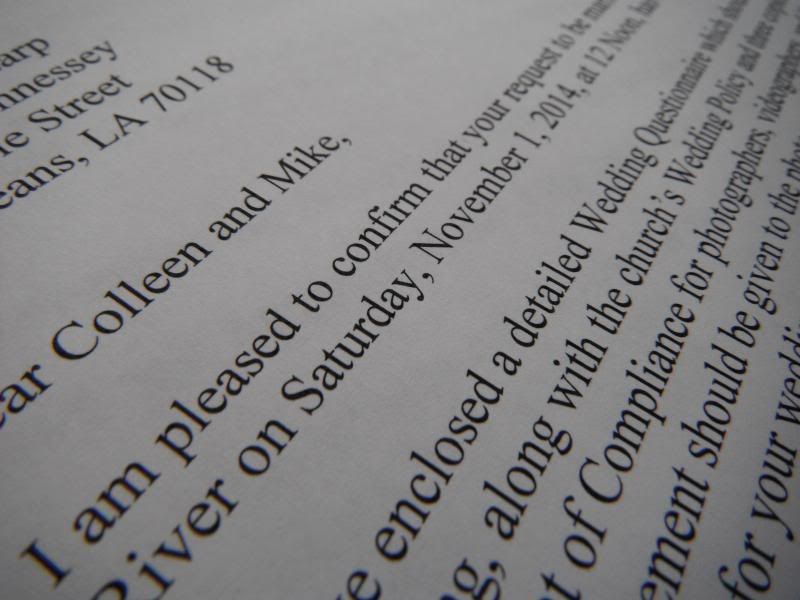
(Well, it will be 33 months later by then, but whatever.)
Josh Ritter, the brilliant artist he is, sang the wonderful words, "So throw away those lamentations, we both know them all too well/ if there's a book of jubilation, we'll have to write it for ourselves..."
So why am I sharing all of this? Because I was totally caught on the idea of meeting people where they are, grieving at the bottom of the pit, and building joy out of that experience. While sitting as a household, we all shared some things we were lamenting and some things we were cursing. I didn't share that I still have moments when I'm grieving about Peace Corps. I shared that I'm lamenting the wetlands here. (Typical Colleen, sharing the thoughts that just barely skim the surface of what I'm even thinking about.) It was true. It was just tangled up in all of these other thoughts, too.
I'm still sometimes sad that I'm not serving in an even more extreme way, but a lot of joy has come out of it, and I am focused on that far more often than the hurt these days. Because I didn't move to the developing world for over two years, I could build an awesome relationship with a great man. Because I didn't go with Peace Corps, I was able to explore the southwest. Because I'm not a Peace Corps Volunteer, I was able to return to camp for a last hurrah with some beloved friends and get a ton of experience with NRCS and serve as the musician for our mission trips and spend more time with my grandmothers and help some people who weathered Sandy clean out their homes and work with my middle school youth and go to a Josh Ritter concert as a guest of the band and have a beautiful picnic with some of my favorite people and a million other joyful things and be at several wonderful weddings and be a bridesmaid in several more and have my own next fall.
Because I didn't do Peace Corps, I ended up here, in southern Louisiana, attempting to jump in the pit alongside the residents of the coast as we attempt to spread the word about the wetlands.
I mentioned before that the Peace Corps news was my most-read post until recently-- that was absolutely defeated by the post when I announced I was coming to New Orleans this year. I don't think I would have made it this far without so many people being willing to jump in the pit with me, and more importantly, wait until I was ready to have company down there. I am just continually amazed at the community of people I get to call my friends. Thank you, thank you, thank you.
This week's meeting, Jess and Kalyn lead us in a discussion ultimately rooted in the Psalms-- psalms of lament, cursing psalms, and psalms of joy. Somewhere between lament and cursing, we talked briefly about the idea of meeting people where they are. Layne shared with us an image that I've heard a few times before, of someone at the bottom of a pit, and two scenarios: one in which others are standing at the top of the pit, inviting the person at the bottom to get out and come join them; one in which someone joins the person at the bottom of the pit, ultimately to help them get out. This image is often used in lessons on counseling.
I was thinking a little bit about Peace Corps again today, because I met someone new who asked me how I ended up in New Orleans with YAV. So when we were talking about lamentation this evening, that is admittedly a little bit of what I was thinking about. I was thinking about how I was so far at the bottom of that pit, and I was so afraid of people standing at the top and telling me to get out that I didn't really talk about the rejection for a month (which became my most viewed blog post ever until recently-- I'll come back to that).
In that month though, I have to give a lot of credit to Mike for absolutely meeting me where I was at the bottom of the pit. We had started seeing each other less than a week before that rejection notice, and the poor guy was probably (definitely) caught between feeling sorry and sad that I was so crushed, and being a little thankful that I wasn't going to leave the country any time soon. I was not sleeping well, and I didn't have the words to talk about the whole ordeal, and it was weighing on me heavily as I attempted to keep it a secret until I did have the words. Mike would come over and just sit. Sometimes we'd watch TV, sometimes we'd just sit. No talking. Sometimes a reassuring pat on the shoulder. Mostly just sitting. (Well, he sat. I often laid because I felt like if I was meeting gravity horizontally, I couldn't fall any further.)
I had to take a deep breath just now. Just thinking about that whole time slams me with a lot of different emotions, and we all know I'm kind of a robot about feelings sometimes.
So about a month later was this:

which we could probably draw all sorts of metaphors about the crazy winding road behind us there. And now eighteen months later is this:

(Well, it will be 33 months later by then, but whatever.)
Josh Ritter, the brilliant artist he is, sang the wonderful words, "So throw away those lamentations, we both know them all too well/ if there's a book of jubilation, we'll have to write it for ourselves..."
So why am I sharing all of this? Because I was totally caught on the idea of meeting people where they are, grieving at the bottom of the pit, and building joy out of that experience. While sitting as a household, we all shared some things we were lamenting and some things we were cursing. I didn't share that I still have moments when I'm grieving about Peace Corps. I shared that I'm lamenting the wetlands here. (Typical Colleen, sharing the thoughts that just barely skim the surface of what I'm even thinking about.) It was true. It was just tangled up in all of these other thoughts, too.
I'm still sometimes sad that I'm not serving in an even more extreme way, but a lot of joy has come out of it, and I am focused on that far more often than the hurt these days. Because I didn't move to the developing world for over two years, I could build an awesome relationship with a great man. Because I didn't go with Peace Corps, I was able to explore the southwest. Because I'm not a Peace Corps Volunteer, I was able to return to camp for a last hurrah with some beloved friends and get a ton of experience with NRCS and serve as the musician for our mission trips and spend more time with my grandmothers and help some people who weathered Sandy clean out their homes and work with my middle school youth and go to a Josh Ritter concert as a guest of the band and have a beautiful picnic with some of my favorite people and a million other joyful things and be at several wonderful weddings and be a bridesmaid in several more and have my own next fall.
Because I didn't do Peace Corps, I ended up here, in southern Louisiana, attempting to jump in the pit alongside the residents of the coast as we attempt to spread the word about the wetlands.
I mentioned before that the Peace Corps news was my most-read post until recently-- that was absolutely defeated by the post when I announced I was coming to New Orleans this year. I don't think I would have made it this far without so many people being willing to jump in the pit with me, and more importantly, wait until I was ready to have company down there. I am just continually amazed at the community of people I get to call my friends. Thank you, thank you, thank you.
Maps (they don't love you like I love you)
Here is the story of how I got my first map of Louisiana.
(hypothetical subtitle: Maps! A multi-media love story)
(I don't necessarily understand the song or the video, but I like it. They don't love you like I love you, maps.)
On Friday, my drive to Bayou Blue was interrupted by a sheriff's officer directing traffic off the main highway. Having already made the drive, I knew where I was supposed to be going, and I don't have or use a GPS anyway (1. I am stubborn about technology, and in this case will use my degrees in geography as my excuse; 2. I like to pretend I am smarter than the GPS; 3. I hate that some people blindly follow the GPS machine without even consulting maps or using their brains; 4. I like maps; 5. I think I get a better idea of the area and learn how to get places better by studying maps and writing out directions by hand; 6. GPS machines aren't known to be entirely effective in many rural places still (see here); 6. etc. etc. etc.).
This is roughly the drive from my neighborhood to Bayou Blue (which is officially Gray, according to most Geographic Information Systems):
View Larger Map
I was directed off Route 90 about 15 miles before my exit. I have no idea why and haven't been able to find out why in the news. The road behind the officer was empty, no sign of an accident or anything, just one other car from the sheriff's department parked down the road, lights flashing. I exit the highway with a long line of cars*, surrounded by sugarcane fields, and I have no idea where I am. So I'm creeping along slowly, figuring, since I'm stuck in traffic going 6 MPH or less with so many other cars, surely I will find my way back to the highway.
Nope.
The traffic sat on the one road in a town I eventually identified as Raceland (thank you, water tower). When we got to the end of the road an hour later, there was another officer, directing traffic, but not in any particular direction. Some cars went left! Some went right! And because the road through the town kind of curved and I had no idea where I was, I didn't know which way to go to get back to the highway. I went left, figuring I was north of the highway, and had been heading west-ish last I could tell. No one else was going left though.
By this point, after drinking a travel mug full of tea and a full liter Nalgene bottle of water, I also really needed to make a pit stop. I pulled over at the first place I found, a nursing home with a few residents sitting on the porch who gave me the code to the door (apparently I did not find the front door, because I also had to go exploring to find a desk). A kind woman behind the desk let me use the employee bathroom and gave me some directions that she wasn't too confident in. I'm not sure she's ever been outside of Raceland.
This is the second time in Louisiana I've had to stop and ask for directions (oddly enough, both times at nursing homes because that was all I could find, but those are the only two nursing homes I've seen). The first time was trying to find the new NRCS field office in Luling, because Google Maps told me to take roads that don't yet exist. I learned from this that I need to ask humans for directions and take any electronic routes with a grain of salt (or cane sugar, perhaps).
So the Raceland woman's directions weren't especially clear or helpful, so I kept going the way that made the most sense according to my rough mental map. Lo and behold, I found Route 90! But after sitting for an hour on a not-so-straight road in the middle of nothing but sugarcane and oil pipelines, I had no idea how far I'd gone.
By some great stroke of grace, there was a tourist information center right next to the highway entrance.
The even nicer lady in the LaFourche ("la-foosh", see, my French is improving?) Parish Tourist Information Center was very happy to give me free maps of the town, parish and state. I was just a few miles east of Bayou Blue, and Route 90 was open from that point west. I arrived less than 20 minutes later, and was still able to squeeze in a visit to BTNEP ("bit-nep", not French), the Barataria-Terrebonne National Estuary Program, another organization I'll be partnering with in my work here.
Barataria is the name of a bay further south, and Terrebonne is the Parish where Bayou Blue and many of the first people I'm working with are located. Look! My Geography of Louisiana is improving, too! I met Kerry, the program director, and when I said something off handed about liking estuaries and having grown up near an big one in New Jersey, he answered, "Oh, Barnegat Bay." I think I will like working with his program.
And now I have some maps, too. I do like maps.
*To further the multi-media experience, Long Line of Cars by Cake is another song I rather enjoy, but there's not an official video for it, nor could I find one I liked enough to post on my blog, but I would encourage you to give a listen.
(hypothetical subtitle: Maps! A multi-media love story)
(I don't necessarily understand the song or the video, but I like it. They don't love you like I love you, maps.)
On Friday, my drive to Bayou Blue was interrupted by a sheriff's officer directing traffic off the main highway. Having already made the drive, I knew where I was supposed to be going, and I don't have or use a GPS anyway (1. I am stubborn about technology, and in this case will use my degrees in geography as my excuse; 2. I like to pretend I am smarter than the GPS; 3. I hate that some people blindly follow the GPS machine without even consulting maps or using their brains; 4. I like maps; 5. I think I get a better idea of the area and learn how to get places better by studying maps and writing out directions by hand; 6. GPS machines aren't known to be entirely effective in many rural places still (see here); 6. etc. etc. etc.).
This is roughly the drive from my neighborhood to Bayou Blue (which is officially Gray, according to most Geographic Information Systems):
View Larger Map
I was directed off Route 90 about 15 miles before my exit. I have no idea why and haven't been able to find out why in the news. The road behind the officer was empty, no sign of an accident or anything, just one other car from the sheriff's department parked down the road, lights flashing. I exit the highway with a long line of cars*, surrounded by sugarcane fields, and I have no idea where I am. So I'm creeping along slowly, figuring, since I'm stuck in traffic going 6 MPH or less with so many other cars, surely I will find my way back to the highway.
Nope.
The traffic sat on the one road in a town I eventually identified as Raceland (thank you, water tower). When we got to the end of the road an hour later, there was another officer, directing traffic, but not in any particular direction. Some cars went left! Some went right! And because the road through the town kind of curved and I had no idea where I was, I didn't know which way to go to get back to the highway. I went left, figuring I was north of the highway, and had been heading west-ish last I could tell. No one else was going left though.
By this point, after drinking a travel mug full of tea and a full liter Nalgene bottle of water, I also really needed to make a pit stop. I pulled over at the first place I found, a nursing home with a few residents sitting on the porch who gave me the code to the door (apparently I did not find the front door, because I also had to go exploring to find a desk). A kind woman behind the desk let me use the employee bathroom and gave me some directions that she wasn't too confident in. I'm not sure she's ever been outside of Raceland.
This is the second time in Louisiana I've had to stop and ask for directions (oddly enough, both times at nursing homes because that was all I could find, but those are the only two nursing homes I've seen). The first time was trying to find the new NRCS field office in Luling, because Google Maps told me to take roads that don't yet exist. I learned from this that I need to ask humans for directions and take any electronic routes with a grain of salt (or cane sugar, perhaps).
So the Raceland woman's directions weren't especially clear or helpful, so I kept going the way that made the most sense according to my rough mental map. Lo and behold, I found Route 90! But after sitting for an hour on a not-so-straight road in the middle of nothing but sugarcane and oil pipelines, I had no idea how far I'd gone.
By some great stroke of grace, there was a tourist information center right next to the highway entrance.
The even nicer lady in the LaFourche ("la-foosh", see, my French is improving?) Parish Tourist Information Center was very happy to give me free maps of the town, parish and state. I was just a few miles east of Bayou Blue, and Route 90 was open from that point west. I arrived less than 20 minutes later, and was still able to squeeze in a visit to BTNEP ("bit-nep", not French), the Barataria-Terrebonne National Estuary Program, another organization I'll be partnering with in my work here.
Barataria is the name of a bay further south, and Terrebonne is the Parish where Bayou Blue and many of the first people I'm working with are located. Look! My Geography of Louisiana is improving, too! I met Kerry, the program director, and when I said something off handed about liking estuaries and having grown up near an big one in New Jersey, he answered, "Oh, Barnegat Bay." I think I will like working with his program.
And now I have some maps, too. I do like maps.
*To further the multi-media experience, Long Line of Cars by Cake is another song I rather enjoy, but there's not an official video for it, nor could I find one I liked enough to post on my blog, but I would encourage you to give a listen.
08 September 2013
faksdjhfasjfsd
I want to write, but don't know what to write about. I'm too tired to sit up and use my pen and journal, so you're stuck with my stream of consciousness this time, dear reader.
This weekend I was on retreat with a few members of my new church, Bayou Blue. It was so, so good to meet a few people for real-- get to talk with them and know them a bit, actually learn their names. I got to hear some of their hurricane stories, some of their oil stories, and some of their good stories, too.
Something that hung with me all weekend was something Rev. Kris pointed out on our car ride up to Feliciana Retreat Center (which is on the border of Mississippi, but a different border than I drove in on), the juxtaposition of the large number of the people driving enormous pick up trucks for no real reason, with the disappearance of the wetlands thanks to the oil and gas industry there.
Also the juxtaposition of something called the Shrimp and Petroleum Festival that apparently just happened down south. Those things seem kind of mutually exclusive to me. I don't understand why you'd celebrate petroleum since it's destroying the wetlands and the seafood industry...
Anyway.
It was good to see the camp that I'll be spending quite a bit of time at in the next handful of weeks. It's a nice place, very peaceful with barely any phone reception, with pine trees and a lake. It's love bug season, which sounds nice, but is actually an enormous pain in the butt, as lightning bugs are mating which makes them all crazy and fly around in swarms and splatter all over the car windshield and get stuck in your hair and clothes. Obnoxious. Take your business elsewhere, fireflies.
But yes, it seems I'll be out of town a lot in the coming weeks. This week I'm spending two days down south for some talks. Pretty much every week I'll need to go south to do some of my work, and that will vary if it's for a day or few. There are a lot of people offering me places to stay when I do go, which is nice. They're even kind about my vegetarianism despite it not really lining up with the cultural norms here. I'm spending every weekend of October at a conference or retreat. Actually, I think that continues into the first weekend of November. A lot of really great, worthwhile things but a lot of time away. I am curious how that will play out on the intentional community part of the program. I am really thankful that my housemates are generally excited, encouraging and seemingly understanding about my work.
I had a good weekend and have lots of thoughts and ideas bouncing around in my brain, but as you can tell, they aren't particularly organized. I still feel the need to write some of them down.
Miscellaneous goals for this week
This weekend I was on retreat with a few members of my new church, Bayou Blue. It was so, so good to meet a few people for real-- get to talk with them and know them a bit, actually learn their names. I got to hear some of their hurricane stories, some of their oil stories, and some of their good stories, too.
Something that hung with me all weekend was something Rev. Kris pointed out on our car ride up to Feliciana Retreat Center (which is on the border of Mississippi, but a different border than I drove in on), the juxtaposition of the large number of the people driving enormous pick up trucks for no real reason, with the disappearance of the wetlands thanks to the oil and gas industry there.
Also the juxtaposition of something called the Shrimp and Petroleum Festival that apparently just happened down south. Those things seem kind of mutually exclusive to me. I don't understand why you'd celebrate petroleum since it's destroying the wetlands and the seafood industry...
Anyway.
It was good to see the camp that I'll be spending quite a bit of time at in the next handful of weeks. It's a nice place, very peaceful with barely any phone reception, with pine trees and a lake. It's love bug season, which sounds nice, but is actually an enormous pain in the butt, as lightning bugs are mating which makes them all crazy and fly around in swarms and splatter all over the car windshield and get stuck in your hair and clothes. Obnoxious. Take your business elsewhere, fireflies.
But yes, it seems I'll be out of town a lot in the coming weeks. This week I'm spending two days down south for some talks. Pretty much every week I'll need to go south to do some of my work, and that will vary if it's for a day or few. There are a lot of people offering me places to stay when I do go, which is nice. They're even kind about my vegetarianism despite it not really lining up with the cultural norms here. I'm spending every weekend of October at a conference or retreat. Actually, I think that continues into the first weekend of November. A lot of really great, worthwhile things but a lot of time away. I am curious how that will play out on the intentional community part of the program. I am really thankful that my housemates are generally excited, encouraging and seemingly understanding about my work.
I had a good weekend and have lots of thoughts and ideas bouncing around in my brain, but as you can tell, they aren't particularly organized. I still feel the need to write some of them down.
Miscellaneous goals for this week
- Get a library card in New Orleans
- Study my new map of Louisiana (I'll explain how and why I got a free map when I am better rested)
- Learn more about the geography of Louisiana-- I plan to do this by following my Geography of New Jersey syllabus and researching accordingly, because I have no other ideas on how to stay focused and organized in my self-education
- Eat healthy. I discovered honey butter this weekend, which made me realize that even as a vegetarian, it might be really exceedingly easy to totally not watch what I eat while living in THE SOUTH.
- I would like to respectfully reneg on my previously mentioned goal of eating food that was cooked with meat, and replace it with, eating however the spirit moves me, but continuing to be a conscientious, educated eater as best I can be
- take some pictures of my neighborhood to share!
04 September 2013
learning Louisiana
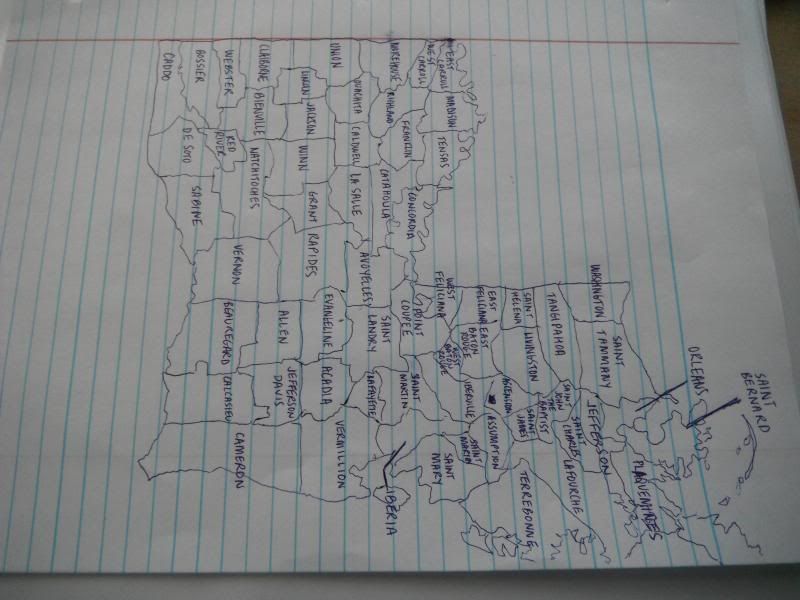
Today for work, I sat home in my pajamas most of the day learning about the people, plants and places of southern Louisiana. I have made a small career out of being familiar with New Jersey (to the point which that I got a famous author/internet personality to publicly and personally apologize to me for dissing the great Garden State). I don't have that same knowledge base here, but I'm working on building some foundation for understanding the local context.
Things I knew about Louisiana before coming here:
- The capital is Baton Rouge.
- I learned in Geography of Eastern North America in college that there's some sort of "cancer alley" from all of the chemical production going on.
- However, being from New Jersey, I will not base my entire opinion of LA on one minor pollutiony detail.
- The Mississippi River dumps into the Gulf of Mexico here, and there's all sorts of wetlands, and they might be shrinking or there might be changes in hydrology and sedimentation patterns because of development stuff I think?
- Probably some other stuff.
- Louisiana has 64 parishes, government areas based on historical Catholic church area divisions.
- New Orleans is in Orleans Parish.
- Bayou Blue and the wetlands area I toured on Sunday are in Terrebonne Parish.
- Number of parishes I'm sure I'm pronouncing incorrectly: at least seven
- Number of parishes I'm probably pronouncing incorrectly: almost all of them that aren't distinctly English or include "Saint" in the name, which is a lot.
- There are 9 parishes named Saint ______.
- Favorite parish name: Natchitoches, probably because I'm not saying it correctly
- Least favorite parish name: Saint Martin, because there appears to be two of them?!
- Just kidding, upon further investigation, it appears that it's just discontinuous. Still confusing.
- State tree: Bald Cypress (I can live with that, though I'm kind of surprised it's not the live oak.)
- State bird: brown pelican
- State flower: magnolia (also a viable candidate for state tree, as far as I'm concerned)
- They have an absurd number of state symbols, including the state crustacean, state meat pie, state jellies (there are two) and state vegetable AND vegetable plant (two different things).
- There are 4 tribes involved with First Peoples' Conservation Council (FPCC). None are federally recognized.
- There are 10 state recognized tribes, including the Isle de Jean Charles (whose kind and hilarious chief I met last Friday, who is actively involved with the FPCC) and Point-au-Chien (the wonderful people we hung out with on Sunday).
- In the past 80 or so years, Louisiana has lost an area of wetlands totaling approximately the size of the entire state of Delaware. An area the size of Manhattan disappears about annually.
I welcome any and all fun facts and solid resources for this stuff. Bring it.
02 September 2013
French, s'il vous plait
On this lovely 90 degree, 90% humidity Labor Day, two of my housemates and I wandered about the French Quarter for a few hours. It was nice to see a little more of the city and enjoy our last day before we all start our jobs.
I've had an interesting time observing French from the moment I crossed the state line from Mississippi on I-59. I'm fairly confident in my complete inability to pronounce anything even vaguely French. I had my spelling corrected approximately 23957 times in the meeting last Friday (ok, just twice, after I wrote down my fifth iteration of the town "Thibodaux"-- Tibido, Tibideaux, Tibideau, Tibidaux, Tibi~~~ (squiggly lines ensued), and after I noticed a specific local forestry term written down on one of the papers being passed around the room). Thankfully, one of the good things that came out of the infamous Peace Corps debacle was plenty of free online French language lessons and resources. Also, I hear there are lessons at my local library. One of my goals for the year: learn enough French that I can at least write things down correctly, or closer to correctly. I'll know I have truly succeeded in this if I can also pronounce street names and business names without the preface, "I know I'm about to embarrass myself..."
I heard a lot more French being spoken in the French Quarter than I expected, oddly enough. People have reassured me over and over that I'll be fine without a background in French or Romance languages (nine years of German and a year of Mandarin? Surprisingly not useful!), but I'm pretty sure I've heard it every day so far. I definitely heard it more on my trips outside of the city, weaving its way into and out of conversations between people whose families have lived in the area for generations.
I guess I was vaguely aware that the French here are related to the French in eastern Canada and northern Maine. This weekend, while down in Bayou Blue, it was pointed out that "Cajun" is a sort of bastardization of "Acadian". It all kind of clicked and I started to think about all of the beautiful things I saw last summer when I drove across eastern Canada with Jamie, Amanda and Katie. The stop signs may not say Arête, but the language is still very present here.
Cajuns were exiled from eastern Canada for failure to pledge allegiance to Britain. They kind of wandered south until they were left alone, settling on the bayou and adapting their culture to the local environment. (This is as opposed to Creole, which are people of France French heritage and sometimes Spanish and Italian.) They invented all sorts of wonderful foods and Zydeco music.
So anyway, French Quarter. It's very touristy, so my lack of French skills was not actually a hindrance. Hannah, Jess and I wandered around the market, checking out local crafts and the myriad of masks, beads and voo doo dolls. We had lunch at Mothers, a legendary po'boy shop where even the cabbage had meat visible in it, so I ordered buttered grits and was plenty happy. Another goal for the year that I am not sure should actually be a goal but am considering anyway: building up to eating food that was cooked with meat in it, but probably not actually eating the meat. So the rice and beans that's cooked with a hunk of ham in it, potatoes and corn cooked in the same pot with the crawfish or shrimp... I'm still really not interested in eating meat, and I'm pretty sure my digestive system isn't either after nearly ten years of vegetarianism, but I really do want to experience the culture as best I can, and I really don't want to turn down the incredible hospitality offered to me here.
I drove, and was happy to do so, to start getting my bearings on the area. The whole Crescent City thing is confusing-- there are streets that go from one side of the city to the other, but they don't exactly run due east-west. Still, we had a pleasant drive, ultimately down Canal Street and Magazine Street back over to our neighborhood, Carrollton. It was a good day.
I've had an interesting time observing French from the moment I crossed the state line from Mississippi on I-59. I'm fairly confident in my complete inability to pronounce anything even vaguely French. I had my spelling corrected approximately 23957 times in the meeting last Friday (ok, just twice, after I wrote down my fifth iteration of the town "Thibodaux"-- Tibido, Tibideaux, Tibideau, Tibidaux, Tibi~~~ (squiggly lines ensued), and after I noticed a specific local forestry term written down on one of the papers being passed around the room). Thankfully, one of the good things that came out of the infamous Peace Corps debacle was plenty of free online French language lessons and resources. Also, I hear there are lessons at my local library. One of my goals for the year: learn enough French that I can at least write things down correctly, or closer to correctly. I'll know I have truly succeeded in this if I can also pronounce street names and business names without the preface, "I know I'm about to embarrass myself..."
I heard a lot more French being spoken in the French Quarter than I expected, oddly enough. People have reassured me over and over that I'll be fine without a background in French or Romance languages (nine years of German and a year of Mandarin? Surprisingly not useful!), but I'm pretty sure I've heard it every day so far. I definitely heard it more on my trips outside of the city, weaving its way into and out of conversations between people whose families have lived in the area for generations.
I guess I was vaguely aware that the French here are related to the French in eastern Canada and northern Maine. This weekend, while down in Bayou Blue, it was pointed out that "Cajun" is a sort of bastardization of "Acadian". It all kind of clicked and I started to think about all of the beautiful things I saw last summer when I drove across eastern Canada with Jamie, Amanda and Katie. The stop signs may not say Arête, but the language is still very present here.
Cajuns were exiled from eastern Canada for failure to pledge allegiance to Britain. They kind of wandered south until they were left alone, settling on the bayou and adapting their culture to the local environment. (This is as opposed to Creole, which are people of France French heritage and sometimes Spanish and Italian.) They invented all sorts of wonderful foods and Zydeco music.
So anyway, French Quarter. It's very touristy, so my lack of French skills was not actually a hindrance. Hannah, Jess and I wandered around the market, checking out local crafts and the myriad of masks, beads and voo doo dolls. We had lunch at Mothers, a legendary po'boy shop where even the cabbage had meat visible in it, so I ordered buttered grits and was plenty happy. Another goal for the year that I am not sure should actually be a goal but am considering anyway: building up to eating food that was cooked with meat in it, but probably not actually eating the meat. So the rice and beans that's cooked with a hunk of ham in it, potatoes and corn cooked in the same pot with the crawfish or shrimp... I'm still really not interested in eating meat, and I'm pretty sure my digestive system isn't either after nearly ten years of vegetarianism, but I really do want to experience the culture as best I can, and I really don't want to turn down the incredible hospitality offered to me here.
I drove, and was happy to do so, to start getting my bearings on the area. The whole Crescent City thing is confusing-- there are streets that go from one side of the city to the other, but they don't exactly run due east-west. Still, we had a pleasant drive, ultimately down Canal Street and Magazine Street back over to our neighborhood, Carrollton. It was a good day.
I'll never be blue, my dreams come true, on Bayou Blue!
Yes, I'm aware that Linda Ronstadt sings Blue Bayou, but I'm working in and around Bayou Blue, LA!
Yesterday was just awesome. The whole house visited my church, a VERY friendly, welcoming, small, rural congregation who worships early and has a brunch feast afterward every Sunday about an hour away from our house in New Orleans. I enjoyed biscuits and grits and fruit salad, and I survived many hugs and lots of hand holding. There's a certain context to a place like this.
I've spoken a little bit about place and placelessness before on here. As we visited Kris and Dick's (the pastors I'm working with on the Wetlands Theological Education Project among other things) house after church yesterday and I explored their expansive library covering wetlands and ecology and spirituality and a whole lot of geography. Oh man, these are my people. Dick and I got to talking about how a lot of the trouble in southern LA is place-space related, meaning, this is currently a PLACE (which has particular, personal meaning and some sort of sentiment, whether good or bad-- the locals certainly have good sentiments about their home here) but is quickly transitioning to a SPACE (which lacks that meaning, either by being wiped out or changed to the point that you can't recognize it for its place, like building the same big box stores in every town, or the landscape being totally destroyed-- it loses its uniqueness).
Now that you've survived the geography lesson du jour (look! I spoke French!), let me tell you what it looks like:
Incredible.
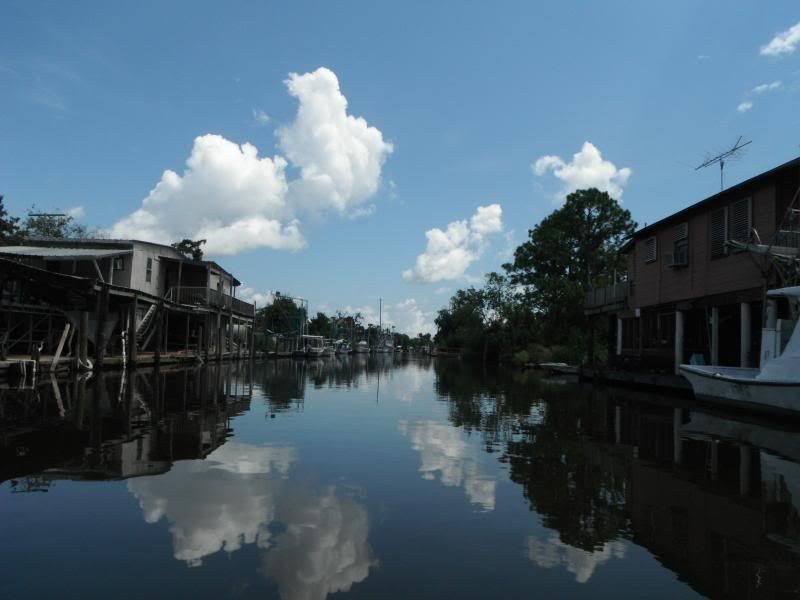
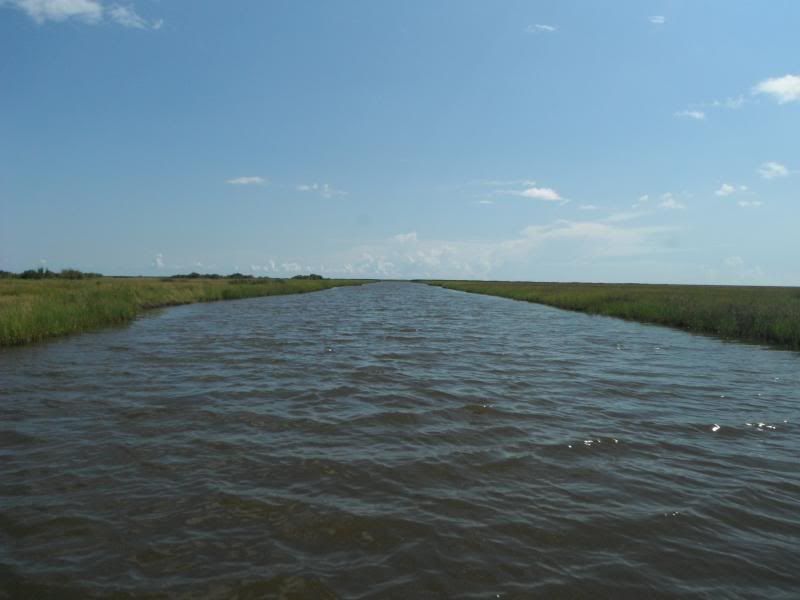
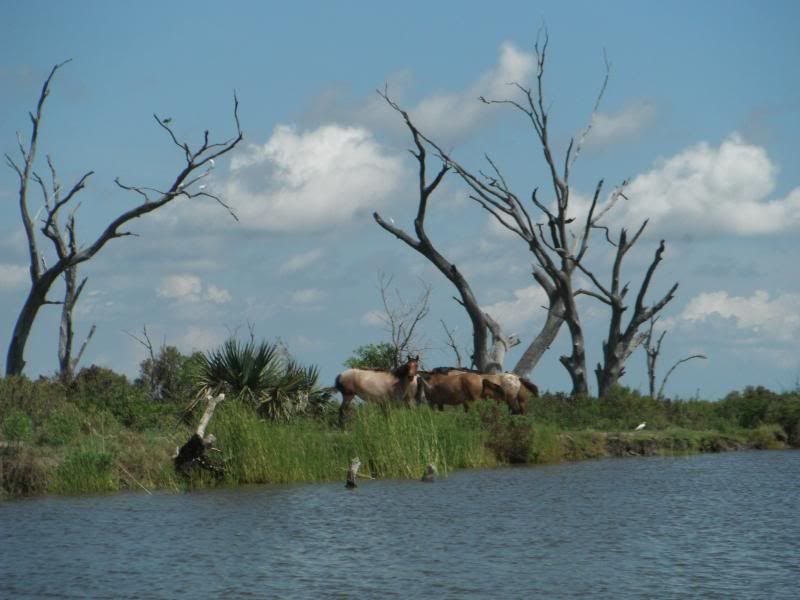
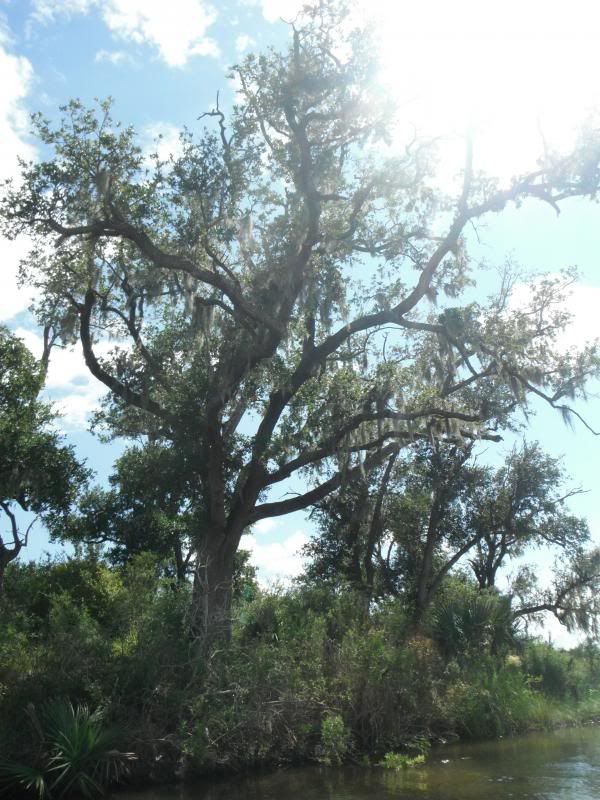
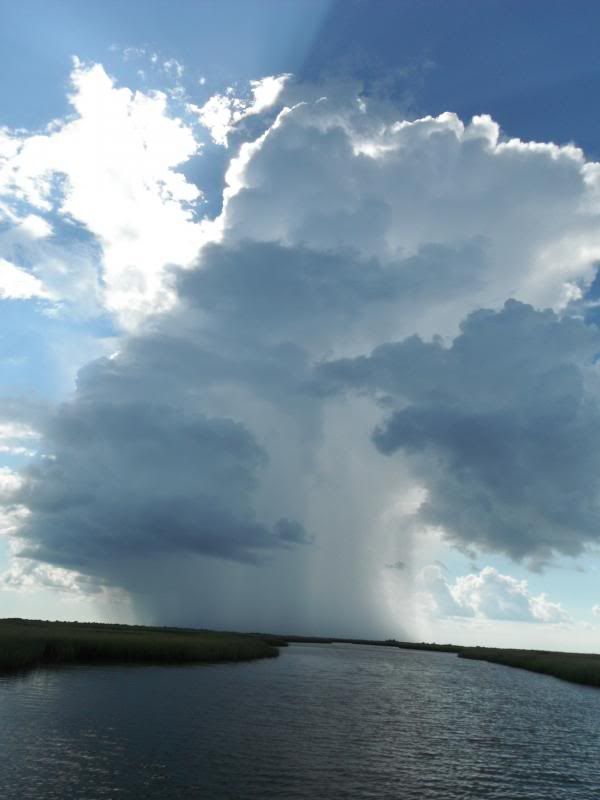
(More of my Louisiana photos can be found here!)
So the problem here isn't just that there are a lot of wetlands, absolutely critical ecosystems, eroding away very rapidly-- for example, this tree stump in the middle of the photo was ON LAND six months ago.
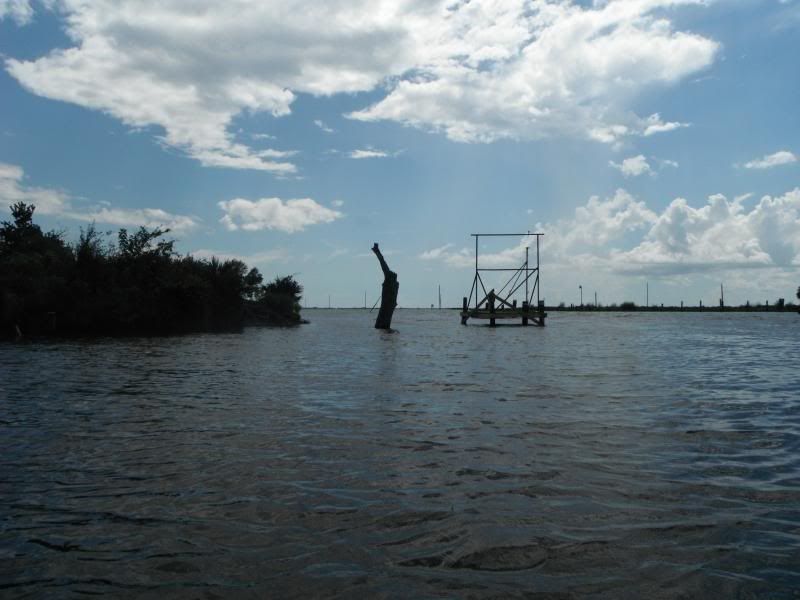
The problem is that the people who live here have strong ties to the place they live. For the most part, they are still subsistence fishers, meaning, they really just harvest enough to survive as a community. They really aren't selling this stuff. Without a healthy ecosystem to fish in, or solid ground to live on, what will happen to the community? And what few, small efforts have been made to move these people inland, only intend to move individuals to new communities, not the entire community together. What will they do? How will they survive without each other? Not very well.
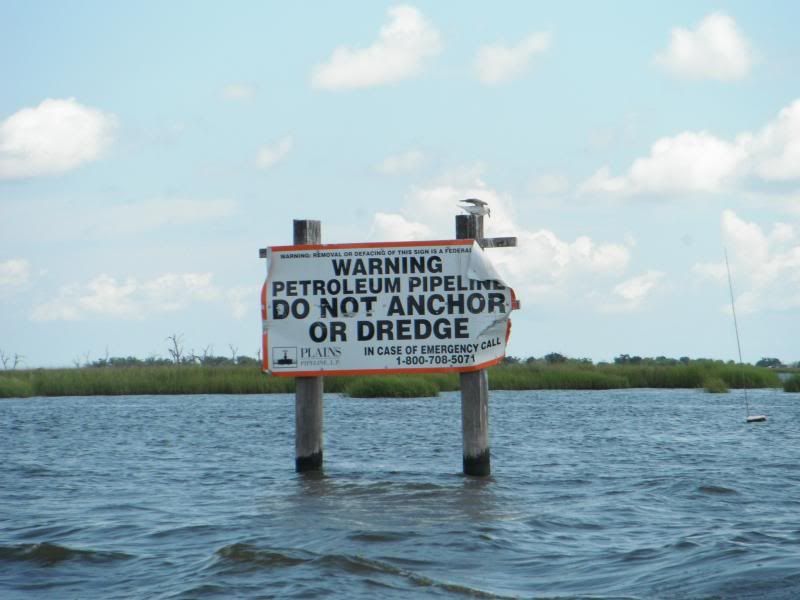
These signs and pipelines were everywhere, for petroleum and for natural gas. Our hosts for the day also let us know that they are damaged and leaking all over the place. No one checks up on them. The wetlands are just being polluted.
It can be very overwhelming to think about.
Instead, I'm going to focus on the beautiful hospitality, the incredible community, and the good work being done to protect it all. Tomorrow is my first day of work. I'm just going to meet some of the researchers I'll be working with and come up with a contract, but it's the first step of many toward supporting some really awesome projects.
We were supposed to experience Cajun music and dancing at a place called the Jolly Inn, but the owner closed up shop to go fishing himself, so we've all agreed to make the trip another time!
Yesterday was just awesome. The whole house visited my church, a VERY friendly, welcoming, small, rural congregation who worships early and has a brunch feast afterward every Sunday about an hour away from our house in New Orleans. I enjoyed biscuits and grits and fruit salad, and I survived many hugs and lots of hand holding. There's a certain context to a place like this.
I've spoken a little bit about place and placelessness before on here. As we visited Kris and Dick's (the pastors I'm working with on the Wetlands Theological Education Project among other things) house after church yesterday and I explored their expansive library covering wetlands and ecology and spirituality and a whole lot of geography. Oh man, these are my people. Dick and I got to talking about how a lot of the trouble in southern LA is place-space related, meaning, this is currently a PLACE (which has particular, personal meaning and some sort of sentiment, whether good or bad-- the locals certainly have good sentiments about their home here) but is quickly transitioning to a SPACE (which lacks that meaning, either by being wiped out or changed to the point that you can't recognize it for its place, like building the same big box stores in every town, or the landscape being totally destroyed-- it loses its uniqueness).
Now that you've survived the geography lesson du jour (look! I spoke French!), let me tell you what it looks like:
Incredible.





(More of my Louisiana photos can be found here!)

The problem is that the people who live here have strong ties to the place they live. For the most part, they are still subsistence fishers, meaning, they really just harvest enough to survive as a community. They really aren't selling this stuff. Without a healthy ecosystem to fish in, or solid ground to live on, what will happen to the community? And what few, small efforts have been made to move these people inland, only intend to move individuals to new communities, not the entire community together. What will they do? How will they survive without each other? Not very well.

These signs and pipelines were everywhere, for petroleum and for natural gas. Our hosts for the day also let us know that they are damaged and leaking all over the place. No one checks up on them. The wetlands are just being polluted.
It can be very overwhelming to think about.
Instead, I'm going to focus on the beautiful hospitality, the incredible community, and the good work being done to protect it all. Tomorrow is my first day of work. I'm just going to meet some of the researchers I'll be working with and come up with a contract, but it's the first step of many toward supporting some really awesome projects.
We were supposed to experience Cajun music and dancing at a place called the Jolly Inn, but the owner closed up shop to go fishing himself, so we've all agreed to make the trip another time!
Subscribe to:
Comments (Atom)
